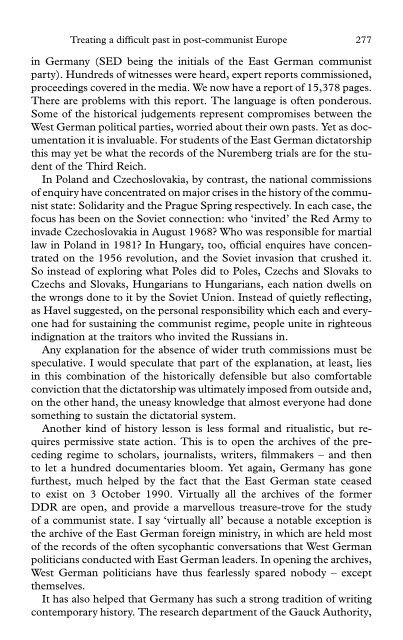Memory and Power in Post-War Europe: Studies in the Presence of ...
Memory and Power in Post-War Europe: Studies in the Presence of ...
Memory and Power in Post-War Europe: Studies in the Presence of ...
Create successful ePaper yourself
Turn your PDF publications into a flip-book with our unique Google optimized e-Paper software.
Treat<strong>in</strong>g a difficult past <strong>in</strong> post-communist <strong>Europe</strong> 277<br />
<strong>in</strong> Germany (SED be<strong>in</strong>g <strong>the</strong> <strong>in</strong>itials <strong>of</strong> <strong>the</strong> East German communist<br />
party). Hundreds <strong>of</strong> witnesses were heard, expert reports commissioned,<br />
proceed<strong>in</strong>gs covered <strong>in</strong> <strong>the</strong> media. We now have a report <strong>of</strong> 15,378 pages.<br />
There are problems with this report. The language is <strong>of</strong>ten ponderous.<br />
Some <strong>of</strong> <strong>the</strong> historical judgements represent compromises between <strong>the</strong><br />
West German political parties, worried about <strong>the</strong>ir own pasts. Yet as documentation<br />
it is <strong>in</strong>valuable. For students <strong>of</strong> <strong>the</strong> East German dictatorship<br />
this may yet be what <strong>the</strong> records <strong>of</strong> <strong>the</strong> Nuremberg trials are for <strong>the</strong> student<br />
<strong>of</strong> <strong>the</strong> Third Reich.<br />
In Pol<strong>and</strong> <strong>and</strong> Czechoslovakia, by contrast, <strong>the</strong> national commissions<br />
<strong>of</strong> enquiry have concentrated on major crises <strong>in</strong> <strong>the</strong> history <strong>of</strong> <strong>the</strong> communist<br />
state: Solidarity <strong>and</strong> <strong>the</strong> Prague Spr<strong>in</strong>g respectively. In each case, <strong>the</strong><br />
focus has been on <strong>the</strong> Soviet connection: who ‘<strong>in</strong>vited’ <strong>the</strong> Red Army to<br />
<strong>in</strong>vade Czechoslovakia <strong>in</strong> August 1968?Who was responsible for martial<br />
law <strong>in</strong> Pol<strong>and</strong> <strong>in</strong> 1981?In Hungary, too, <strong>of</strong>ficial enquires have concentrated<br />
on <strong>the</strong> 1956 revolution, <strong>and</strong> <strong>the</strong> Soviet <strong>in</strong>vasion that crushed it.<br />
So <strong>in</strong>stead <strong>of</strong> explor<strong>in</strong>g what Poles did to Poles, Czechs <strong>and</strong> Slovaks to<br />
Czechs <strong>and</strong> Slovaks, Hungarians to Hungarians, each nation dwells on<br />
<strong>the</strong> wrongs done to it by <strong>the</strong> Soviet Union. Instead <strong>of</strong> quietly reflect<strong>in</strong>g,<br />
as Havel suggested, on <strong>the</strong> personal responsibility which each <strong>and</strong> everyone<br />
had for susta<strong>in</strong><strong>in</strong>g <strong>the</strong> communist regime, people unite <strong>in</strong> righteous<br />
<strong>in</strong>dignation at <strong>the</strong> traitors who <strong>in</strong>vited <strong>the</strong> Russians <strong>in</strong>.<br />
Any explanation for <strong>the</strong> absence <strong>of</strong> wider truth commissions must be<br />
speculative. I would speculate that part <strong>of</strong> <strong>the</strong> explanation, at least, lies<br />
<strong>in</strong> this comb<strong>in</strong>ation <strong>of</strong> <strong>the</strong> historically defensible but also comfortable<br />
conviction that <strong>the</strong> dictatorship was ultimately imposed from outside <strong>and</strong>,<br />
on <strong>the</strong> o<strong>the</strong>r h<strong>and</strong>, <strong>the</strong> uneasy knowledge that almost everyone had done<br />
someth<strong>in</strong>g to susta<strong>in</strong> <strong>the</strong> dictatorial system.<br />
Ano<strong>the</strong>r k<strong>in</strong>d <strong>of</strong> history lesson is less formal <strong>and</strong> ritualistic, but requires<br />
permissive state action. This is to open <strong>the</strong> archives <strong>of</strong> <strong>the</strong> preced<strong>in</strong>g<br />
regime to scholars, journalists, writers, filmmakers – <strong>and</strong> <strong>the</strong>n<br />
to let a hundred documentaries bloom. Yet aga<strong>in</strong>, Germany has gone<br />
fur<strong>the</strong>st, much helped by <strong>the</strong> fact that <strong>the</strong> East German state ceased<br />
to exist on 3 October 1990. Virtually all <strong>the</strong> archives <strong>of</strong> <strong>the</strong> former<br />
DDR are open, <strong>and</strong> provide a marvellous treasure-trove for <strong>the</strong> study<br />
<strong>of</strong> a communist state. I say ‘virtually all’ because a notable exception is<br />
<strong>the</strong> archive <strong>of</strong> <strong>the</strong> East German foreign m<strong>in</strong>istry, <strong>in</strong> which are held most<br />
<strong>of</strong> <strong>the</strong> records <strong>of</strong> <strong>the</strong> <strong>of</strong>ten sycophantic conversations that West German<br />
politicians conducted with East German leaders. In open<strong>in</strong>g <strong>the</strong> archives,<br />
West German politicians have thus fearlessly spared nobody – except<br />
<strong>the</strong>mselves.<br />
It has also helped that Germany has such a strong tradition <strong>of</strong> writ<strong>in</strong>g<br />
contemporary history. The research department <strong>of</strong> <strong>the</strong> Gauck Authority,
















